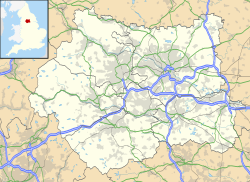Grubstones
 | |
 Shown within West Yorkshire | |
| Location | West Yorkshire |
|---|---|
| Coordinates | 53°53′54″N 1°47′38″W / 53.89836°N 1.79400°WCoordinates: 53°53′54″N 1°47′38″W / 53.89836°N 1.79400°W |
| Type | Stone circle |
| History | |
| Periods | Bronze Age |
The Grubstones (grid reference SE136447) is a stone circle on in West Yorkshire, England. It is believed to be either an embanked stone circle or a ring cairn.
Location[]
The Grubstones circle is located on Burley Moor (to the east of Ilkley Moor).[1] It is situated below the top of the hill on a gentle south facing slope.[2] The circle is just over 800 metres south-east of the Twelve Apostles.[1] South-east of the circle there are several large cairns including The Skirtful of Stones.[3]
Description[]
The circle has a diameter of about 10 metres.[3] It is almost perfectly circular with twenty surviving stones.[3] The stones are set on the inside of a low bank, about 1.8 metres wide.[1][2] The circle has been described variously as a cairn circle, a ring cairn enclosure, or a stone circle.[4] One third of the circle on the south side has been destroyed by shooting butts.[1] Four large loose stones in the interior may have come from this break.[2] The interior was excavated circa 1846 which revealed a cremation, accompanied by a flint spearhead.[2]
In the 20th century there was additional damage in the form of a subrectangular earthwork mound said to be an "orgone accumulator".[2] Orgone is supposed to be a vital energy or life force which informs the universe, and which can be collected and stored in an orgone accumulator for subsequent use in the treatment of illness.[2]
Notes[]
- ^ a b c d James Dyer, (2001), Discovering Prehistoric England, page 230. Osprey Publishing. ISBN 0747805075
- ^ a b c d e f Historic England. "GRUBSTONES (50140)". Research records (formerly PastScape). Retrieved 22 May 2013.
- ^ a b c Timothy C. Darvill, Paul Stamper, Jane R. Timby, (2002), England: An Oxford Archaeological Guide to Sites from Earliest Times to AD 1600, page 149. Oxford University Press. ISBN 0192841017
- ^ Paul Bennett, 1995, Circles, standing stones and legendary rocks of West Yorkshire, page 33. Heart of Albion
- Stone circles in England
- Buildings and structures in the City of Bradford
- Yorkshire building and structure stubs
- United Kingdom archaeology stubs
